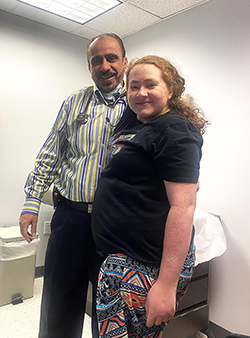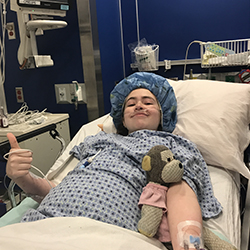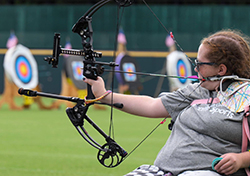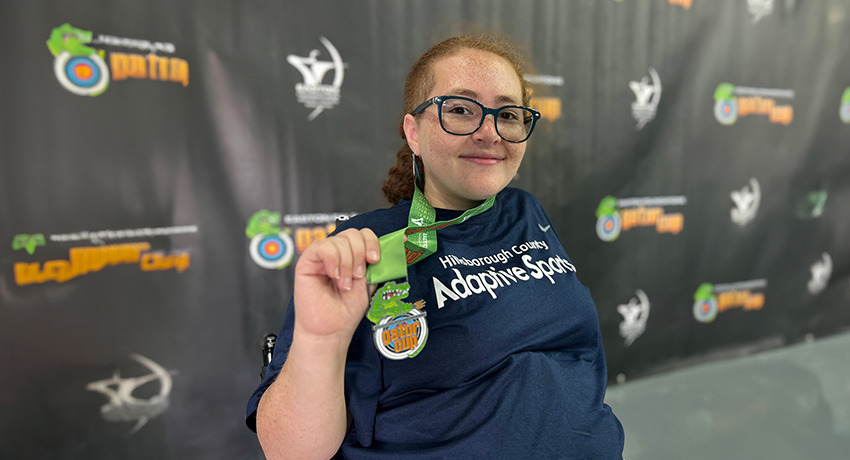Growing up, Natalia Rijos always felt a little different. She had a strange gait, frequent ankle sprains, and constant fatigue that her doctors couldn’t explain. They said it was normal. It wasn’t. But today, her health is on target, and she’s forever grateful to her UT Physicians medical team.
“Without Dr. Numan, I think I’d still be lying in a bed and not living the life I’m currently living,” Natalia said.

Misdiagnosed and dismissed
As a preteen, Natalia’s symptoms worsened when her family moved from Florida to Texas. She started fainting regularly, requiring frequent trips to the emergency room.
“They had no idea what was wrong with me,” Natalia said.
It wasn’t until Natalia was 13 that she finally got answers. Her mom made an appointment with a neurologist who immediately suspected Natalia had dysautonomia. He referred her to Mohammed Numan, MD, a pediatric cardiologist at UT Physicians Pediatric Center Cardiology – Texas Medical Center.
Listening with an ear to heal
“When people hear ‘it’s all in your head,’ over and over from doctors, it breaks them,” Numan said. “Natalia came to me worried that I’d dismiss her symptoms just like others had.”
Instead of brushing off her complex symptoms, Numan conducted detailed tests, including a tilt table test and heart ultrasound. His diagnosis confirmed Natalia has dysautonomia. This disorder affects the autonomic nervous system that controls involuntary body functions such as heart rate, blood pressure, and temperature regulation. Numan compared dysautonomia to your body’s autopilot system not working properly.

“For most people, things like standing up, dealing with heat, or digesting food happen automatically,” said Numan, professor of pediatric cardiology at McGovern Medical School at UTHealth Houston. “But for someone with dysautonomia, these simple tasks can trigger dizziness, fainting, nausea, and severe fatigue.”
The condition often has a genetic component and can be triggered by various factors. Not everyone experiences the same symptoms or severity, which can make it challenging to diagnose. For Natalia, it affected multiple systems, from gastrointestinal issues to chronic headaches. The hardest times were during puberty, when hormonal changes were also impacting her nervous system.
“Dr. Numan has helped us navigate treatments and manage my symptoms so I can live as normal a life as possible,” Natalia said. “He’s been our quarterback ever since.”
One of those treatments was discovering and repairing a small hole in Natalia’s heart, which improved her headaches by 70%. Combined with careful medication management, this intervention helped Natalia regain the functionality she’d lost. Now 24, Natalia said her symptoms have calmed down quite a bit since her teenage years.

Pursuing her passion for archery
Despite the challenges, Natalia has found a sport that brings her joy. Archery is the one thing that makes her feel normal and in control of her body.
“When I’m shooting, the rest of the world just fades away,” Natalia said. “It’s like meditation for me. When I release, I’m releasing anger, resentment, and bad feelings.”
Natalia is pouring her heart and hands into this new sport and working toward qualifying for the Paralympics. While she narrowly missed making the 2024 team, she has set her sights on the LA 2028 Paralympic Games.
“Archery has opened up so many amazing opportunities for me to travel and compete,” she said. “It’s been life-changing.”
Inspiring others

Natalia has some advice for others struggling with dysautonomia or other mysterious, chronic illnesses.
“Keep searching for the right doctors who will listen and validate you. They’re out there, I promise,” Natalia said. “Don’t let your condition define you — there’s so much more to life.”
After following Natalia’s progress for a decade, Numan is inspired by her determination. She has never surrendered to her condition. Even after moving back to Florida, she maintained her connection to UT Physicians to ensure she improved.
“Natalia has shown us that dysautonomia doesn’t have to be a crippling disease,” Numan said. “She has achieved so much despite her symptoms. I hope her story inspires other patients to keep pushing forward.”


